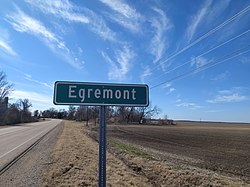Egremont | |
|---|---|
 | |
| Coordinates: 32°51′38″N90°54′12″W / 32.86056°N 90.90333°W | |
| Country | United States |
| State | Mississippi |
| County | Sharkey |
| Elevation | 108 ft (33 m) |
| Time zone | UTC-6 (Central (CST)) |
| • Summer (DST) | UTC-5 (CDT) |
| GNIS feature ID | 669697 [1] |
Egremont is an unincorporated community in Sharkey County, Mississippi, United States. A variant name for the community is "Baconia". [1]
Contents
Egremont is located on U.S. Route 61, 4 miles (6.4 km) south of Rolling Fork.



